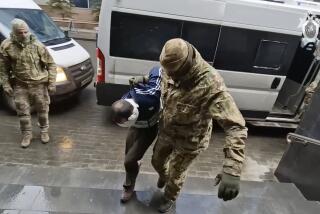Russian Muslims Form Electoral Bloc : Politics: Delegates in Moscow describe party as secular movement. But some fear religious divisiveness like that which led to war in Chechnya.
- Share via
MOSCOW — Seeking to turn a post-Soviet revival of their faith into political power, Muslims from across Russia formed an electoral bloc Sunday to run for Parliament and fight discrimination against the country’s second-largest religious community.
The Muslim Union of Russia, which aims to speak for 18 million Islamic believers, gathered delegates from 60 of the country’s 89 regions and republics for an inaugural congress that began and ended with Koranic prayers in Arabic.
The three-day meeting was just one of many held in Moscow over the weekend by parties priming for the Dec. 17 elections. But the potentially explosive mix of religion and politics in the former Soviet Union gives it a significance broader than the fall campaign.
Except for a tiny Christian Democratic party, the Muslim Union is the first Russian party to enter post-Soviet politics in defense of a religious belief. Some here--mindful of the religious backdrop of the war in Russia’s separatist Muslim region of Chechnya--worry that the new party may be a bad omen.
Muslims and followers of the Russian Orthodox Church, who number about 60 million, are emerging from seven decades of communism with renewed fervor and growing wariness of each other. Last week, the Russian Orthodox patriarch, Alexi II, warned that the Muslim Union “might bring about confrontation in Orthodox-Muslim relations and give rise to a new split in society.”
And the top Muslim clergymen of Moscow and Kazan, two important Islamic centers, distanced themselves from the party, noting that Russia’s law on freedom of worship bars religious organizations from taking part in election campaigns.
Organizers of the Muslim Union took pains to describe it as a secular movement--a badge of ethnic as well as religious identity--that is willing to work with other faiths and opposes violence, separatism and fundamentalism.
“Non-Muslim people of Russia should not be afraid of us, because what unites us here is not so much our religion but our civilization,” Ramazan G. Abdulatipov, the highest-ranking Muslim in the current Parliament, told the delegates. “Let the muftis lead prayers in the mosques. Our duty as politicians is to ensure normal, legal conditions for the flourishing of our people.”
Even before the brutal Russian assault on Chechnya that began in December, Muslims felt like second-class citizens in Russia, speakers at the congress complained.
The government’s support for cathedral restorations and observance of the Christmas holiday, they said, give Orthodox Christianity the informal status of a state religion. There are services for Christians in the armed forces but not for Muslims in most units.
Muslims suffer job discrimination and police brutality, they say, and are underrepresented in public life. Muslims make up 12% of the national population but rarely get Cabinet posts, and they hold just 17 seats, or 3.8%, of the 450 seats in the Duma, or lower house of Parliament, elected in 1993.
By offering a list of candidates for the 225 Duma seats to be apportioned according to nationwide vote totals, the new party hopes to increase the number of Muslim lawmakers and push a program to reverse discriminatory practices by the government and the military.
The program, adopted by the congress without debate, also calls for greater government investment in Muslim-dominated regions of Russia, Arab language studies in all Russian high schools, scholarships for young Muslims to study their religion abroad and public funds to help pilgrims travel to Mecca.
But Muslims are far from united. Between prayers, the congress was marked by regional and personal feuds that left many of the 196 delegates wondering whether they can work together in Parliament if they manage to get elected.
It was a disaffected Muslim from ultranationalist Vladimir V. Zhirinovsky’s party, Akhmet Khalikov, who convened the congress Friday as its self-appointed general secretary. By Saturday he had been ousted from that post--his microphone was shut off--under criticism for failing to speak out earlier against Zhirinovsky’s racism.
The ensuing leadership struggle pitted Chechens and other separatist-minded Muslims from the southern Caucasus Mountains against moderates from Tatarstan and other parts of central Russia’s Volga River valley.
In an exchange of shouted epithets, the Caucasians were branded as “fundamentalists,” while the Volga delegates were accused of abetting “colonists” from Moscow. “Stop the circus!” a frustrated delegate shouted at one point.
Mukkadas Bibarsov, the widely respected mufti of the Central Volga region, was elected general secretary. Then, without settling their own political differences, the delegates under his guidance chose a regionally balanced list of Duma candidates, all of them secular, and went home. The list is led by Ruslan Aushev, president of the Caucasus republic of Ingushetia, and Rashid Akhunov, Tatarstan’s minister of foreign economic relations.
“We haven’t really outlined our strategic and tactical tasks,” said Shamil Bino, a former foreign minister of Chechnya, who tried to push a more radical agenda at the congress. “All we agreed on is a list of candidates to represent our interests. But what are those interests?”
More to Read
Sign up for Essential California
The most important California stories and recommendations in your inbox every morning.
You may occasionally receive promotional content from the Los Angeles Times.













